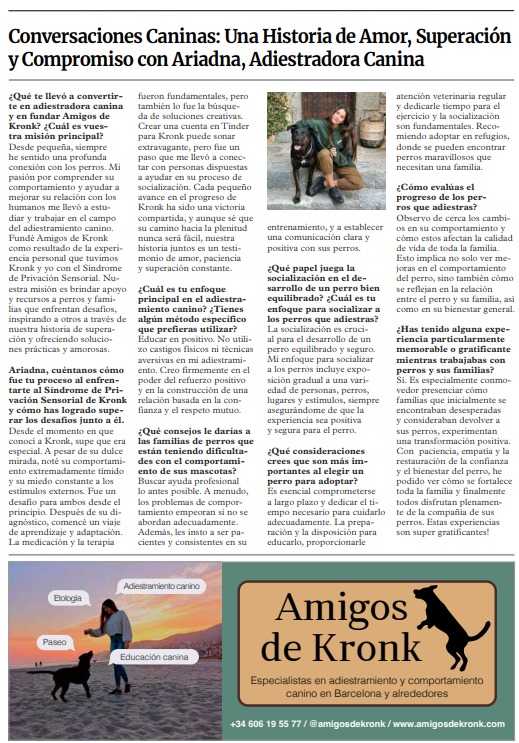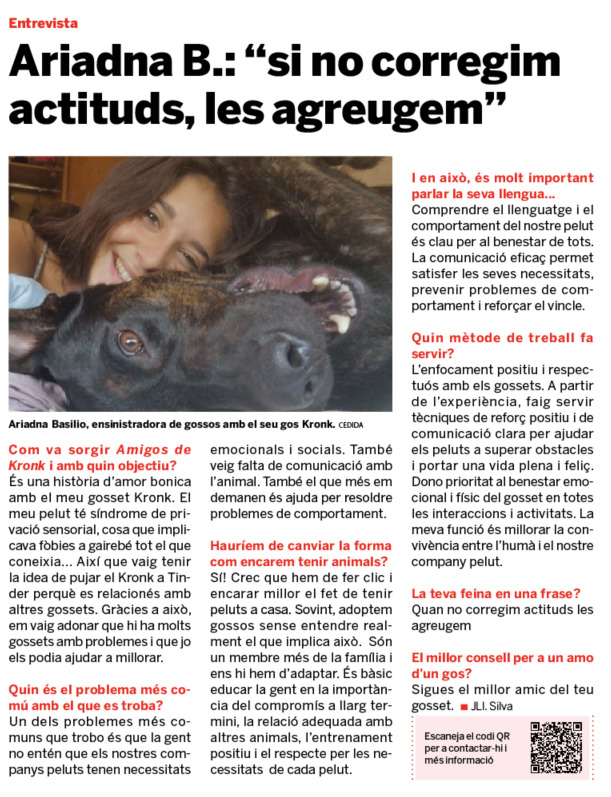Canine Conversations: A History of Love, Overcoming and Commitment to Ariadna, Canine Trainer
What led you to become a canine trainer and found Friends of Kronk? What is your main mission?
Since childhood, I have always felt a deep connection with dogs. My passion for understanding her behavior and helping to improve her relationship with humans led me to study and work in the field of canine training. I founded Friends of Kronk as a result of the personal experience Kronk and I had with Sensorial Privation Syndrome. Our mission is to provide support to dogs and families facing challenges, inspiring others through our story of overcoming and offering practical and loving solutions.
Ariadna, tell us what your process was like when you faced Konnk’s Sensorial Privation Syndrome and how you managed to overcome the challenges with it.
From the moment I met Konnk, I knew it was special. Despite his sweet look, I noticed his extremely shy behavior and his constant fear of external stimuli. It was a challenge for both from the beginning. After his diagnosis, I started a learning and adaptation journey. Medication and therapy were fundamental, but so was the search for creative solutions. Creating a Tinder account for Kronk may sound extravagant, but it was a step that led me to connect with people willing to help in their socialization process. Every small advance in Kronk's progress has been a shared victory, and while I know that his path to fullness will never be easy, our story together is a testimony of love, patience and constant overcoming.
What is your main focus on canine training? Do you have any specific method you prefer to use?
To educate in positive. I don't use physical punishments or aversive techniques in my training. I firmly believe in the power of positive reinforcement in building a relationship based on trust and mutual respect.
What advice would you give to families of dogs who are having difficulties with their pets’ behaviour?
Search for professional help as soon as possible. Behavioural problems often get worse if they are not adequately addressed. In addition, I urge them to be patient and consistent in their training, and to establish clear and positive communication with their dogs.
What role does socialisation play in the development of a well-balanced dog? What is your approach to socialising the dogs you train?
Socialisation is crucial to the development of a balanced and safe dog. My approach to socialising dogs includes gradual exposure to a variety of people, dogs, places and stimuli, always ensuring that the experience is positive and safe for the dog.
What considerations do you think are most important when choosing a dog to adopt?
It is essential to commit to the long term and to spend the time necessary to take care of it properly. Preparation and willingness to educate, provide regular veterinary care and devote time to exercise and socialisation are fundamental. I recommend adopting in shelters, where you can find wonderful dogs that need a family.
How do you assess the progress of the dogs you train?
I observe closely the changes in their behaviour and how these affect the quality of life of the whole family. This involves not only seeing improvements in dog behavior, but also how they are reflected in the relationship between the dog and his family, as well as in his general well-being.
Have you had a particularly memorable or rewarding experience while working with dogs and their families?
It is particularly moving to witness families who were initially desperate and considered returning their dogs, undergoing a positive transformation. With patience, empathy and the restoration of the dog’s confidence and well-being, I have been able to see how the whole family is strengthened and finally everyone fully enjoys the company of their dogs. These experiences are super gratifying!


TOT Sant Cugat interviews Ariadna Basilio, dog trainer and co-founder of Amigos de Kronk.
How did Amigos de Kronk arise and for what purpose?
It's a beautiful love story with my Kronk puppy. My hair has sensory deprivation syndrome, which implied phobias in almost everything I knew... So I had the idea of getting the Kronk up to Tinder to relate to other puppies. Thanks to this, I realized that there are many dogs with problems and that I could help them improve.
What is the most common problem with what you find?
One of the most common problems I find is that people do not understand that our hairy colleagues have emotional and social needs. I also see a lack of communication with the animal. Also, what they ask me most is help to solve behavioral problems.
Should we change the way we face animals?
Yes, I think we have to click and face better the fact of having hairy at home. Often, we adopt dogs without really understanding what this implies. They are one more member of the family and we have to adapt to them. It is essential to educate people about the importance of long-term engagement, the right relationship with other animals, positive training and respect for the needs of each fur.
And in this, it is very important to speak your language... Understanding the language and behavior of our furry is key to the well-being of all. Effective communication allows you to meet your needs, prevent behavioural problems and strengthen the link.
What method of work does it use?
The positive and respectful approach to dogs. Based on experience, I use positive reinforcement and clear communication techniques to help the hairy to overcome obstacles and lead a full and happy life. I give priority to the emotional and physical well-being of the dog in all interactions and activities. My function is to improve the coexistence between the human and our furry companion.
Your work in a sentence?
When we don’t correct attitudes we aggravate them
The best advice for a dog owner?
Be the best friend of your dog.





_clipdrop-background-removal.png)